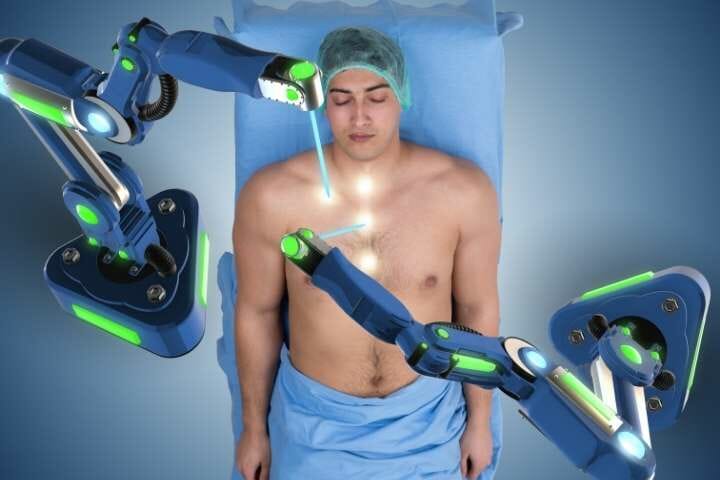Modern medical advancements may seem like all surgeries are done robotically, and are becoming as minimally invasive as possible.

With new technologies coming out every day many people who are on Medicare may start to ask if they are covered for these latest and greatest procedures, of if their benefits do not cover them.
Does Medicare Cover Robotic Surgery?
In short – yes. Medicare will cover all necessary and life-saving medical procedures regardless of how they are conducted.
The FDA has approved robotic surgeries so this means that they are going to be covered under Medicare benefits for those who qualify.
Are Robotic Surgeries Preferred To Traditional Surgeries?
The minimally invasive procedures that are becoming much more common among medical procedures.
They are quicker to perform, which means that patients do not need to be under anesthesia for as long or maybe not even at all if the procedure can be performed on an outpatient basis.
In fact, in some situations the use of minimally invasive surgical techniques have actually improved a patient’s outcome and drastically reduced their recovery time.
You might like to read: Pros and Cons of Partial Knee Replacement
Does Medicare Advantage Cover Robotic Surgeries?
For people who have a Medicare Advantage plan, they get the same coverage that those who have regular Medicare would get. The only difference can be found in how much of the procedure is going to be covered under the benefit coverage.
Medicare Part B will typically cover about 80% of your total costs, while Medicare Advantage does not cover you for as much. This means that with these plans you may end up paying more of your own costs with your own money.
Any coverage is better than no coverage, but there are still some plans that are better than others. If you can afford to, having a Medigap plan will give you more coverage than a Medicare Advantage plan will.
Does Medicare Supplements Cover The Same Types Of Surgeries?
When it comes to coverage, Medicare Supplements is responsible for covering everything everything that regular Medicare covers.

So the good news is that if you know your surgery is going to be covered by regular Medicare then you know that your Medicare Supplement benefits will fill in and cover the rest that Medicare doesn’t.
Further, depending on your exact type of Medicare coverage you may end up paying nothing out of your own money because Medicare is going to cover all of it for you.
Rehabilitation And Robotic Surgery
Like any surgery, there will be some healing time needed to make sure you recover properly and they surgery did what it is supposed to do.
With minimally invasive surgeries they may be less rehabilitation time, though. This is due to not needing the same type of wound care or skilled nursing care to make sure the incision heals properly.
However, if you do require a stay at a hospital or extended care facility then you would still get the same type of coverage as you would with other surgeries.
If you require medications to go home with to help with pain management and healing then these would also be covered under your Medicare benefits.
You might like to read: Does Medicare Cover Erectile Dysfunction Pumps?
Medicare Advantage May Limit Your Options To Robotic Surgeries
For those people who are on Medicare Advantage plans, you could be limited to the medical and surgical facilities that you have access to. Additionally, the facilities you do have access to, and that are approved by Medicare Advantage, may not have the robotic technology for surgery available.
So this isn’t to say that Medicare specifically will deny the use of robotic assistance during a surgery, but they may not have hospitals on their approved provider list that incorporate the use of this technology.
What Are The Benefits For Robotic Surgery Over Traditional Surgeries?
One of the major benefits noted in robotic surgeries is that they allow the surgeon to be much precise during the surgery and also allows for improved access and enhanced visualization.

During the surgery, there is typically less blood loss because the patient doesn’t have to be completely cut open plus there is less risk of infection with less exposure.
The area that the surgery was performed in will usually have a much smaller scar than with a traditional surgery because they don’t have to cut open the area.
Further, patients usually experience shorter hospital stays while recovering from the surgery so they can go home to their families quicker and be back to work.
As successfully as robotic surgeries have been, these outcomes are patient and procedure specific. So there are some patients who have had negative outcomes with robotic procedures just like there would have been for traditional surgeries.
All surgery is a risk, however robotic surgeries have been proven to have less change of a negative outcome and the patient returning to normal daily activities quicker.
You might like to read: What Is The Difference Between Medicare And Medicaid?
Does Robotic Surgery Make A Surgeon Unnecessary?
When people hear that robotics are coming into an industry, many people believe it is going to take away the need for a human to do the job. In the case of surgery, though, this is just not true.
In fact, using robotic assistance surgeons can be incredibly precise and perform very technical procedures much easier than they ever could before.
Additionally, robotic assistance cannot be programmed and therefore these machines cannot make decisions on their own. They need doctor to operate them and direct the machine with what they want it to do next.
Is The Surgeon Performing The Surgery Using Virtual Reality?
While the doctor will be seated a few feet away from the patient during the procedure, they are not operating using virtual reality.
Everything the doctor sees on the screen will be real-time, exactly as the patient is presenting during the surgery. This is an actual image of the surgical field.
The system is not programmed to operate outside of the surgeon’s control and therefore the surgeon must make the decisions as to what they want the operating machine to do next.

Which Surgical Procedures Can Be Done Using Robotic Assistance?
The good news is that almost any surgery can be done using robotic, minimally invasive techniques.
From shoulder repairs and replacements to complete hysterectomies, there has been progress in all areas of surgery and so almost any of them can be done using this assistance.
Many of the surgeries that use minimally invasive techniques are done for hip and knee replacements, as well as gastric bypass surgeries for weight loss. This can be used for other surgeries like appendectomies though too.
Any time the doctor can reduce patient down time and risk of infection or blood loss, they will do their best to take that route.
It is important to note, though, that in some cases a minimally invasive procedure may not be possible for a particular patient.
While the doctor may try, the case may become too complicated to do through the small incisions and they may need to make a bigger incision to complete the surgical procedure.
This could happen mid-surgery or it could happen before the patient goes into the operating room.
You might like to read: Future Of Senior Care – All You Need To Know
What If The Robotic Surgery You Are Having Is Elective?
When it comes to Medicare, it doesn’t really matter if the surgery is robotic or traditionally done – what matters is how necessary it is.

For Medicare, they will cover all medically necessary procedures that will save your life or prevent a current condition from getting worse and impacting your quality of life.
Your doctor will determine, and be able to confirm with Medicare, what the conditions are and why they are recommending surgery.
If you choose to go through with an elective procedure you should be prepared to pay for all of it, just in case. There may be some form of coverage available through Medicare but don’t count on it when it’s not necessary.
Final Thoughts
Going for any surgery can be scary and overwhelming, Knowing that the doctors who are going to be operating on you are up to date on all the latest technology and available options can make you feel a little more at ease with going through with the procedure.
Robotic assistance in the operating room is the most up to date way of performing minimally invasive surgeries so that the patient recovers quicker and is much less prone to infection.
Surgical incisions can take a long time to heal, so if the doctor doesn’t have to cut open a patient then it means that their patient can be back to their daily life much quicker.
There may still be some physical therapies needed or follow up appointments to make sure the surgery was a success, but the downtime after a minimally invasive procedure is significantly less.
If your doctor is recommending a procedure for you but you aren’t sure if Medicare will cover it then you will need to reach out to your Medicare contact to confirm exactly what coverage you get and how much – if anything – you will need to pay out pocket.Medicare recipients do have access to the latest technologies in medicine, so don’t be afraid to get that surgery and improve your quality of life!
